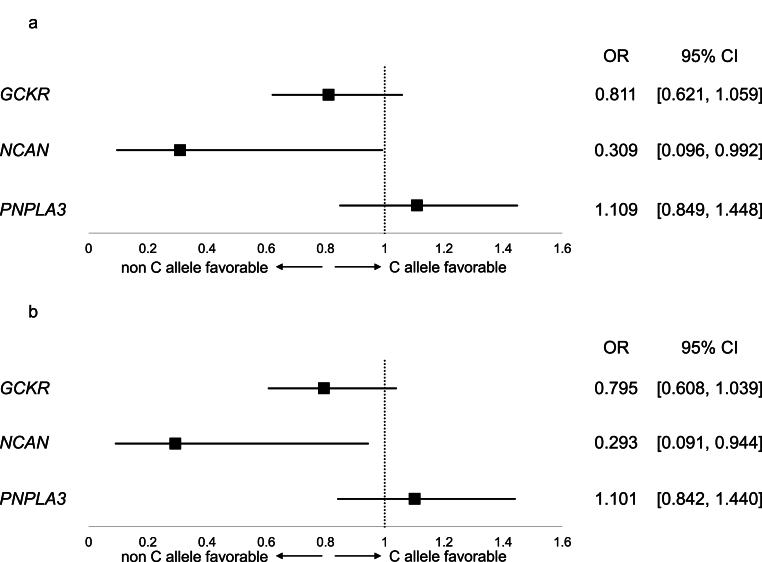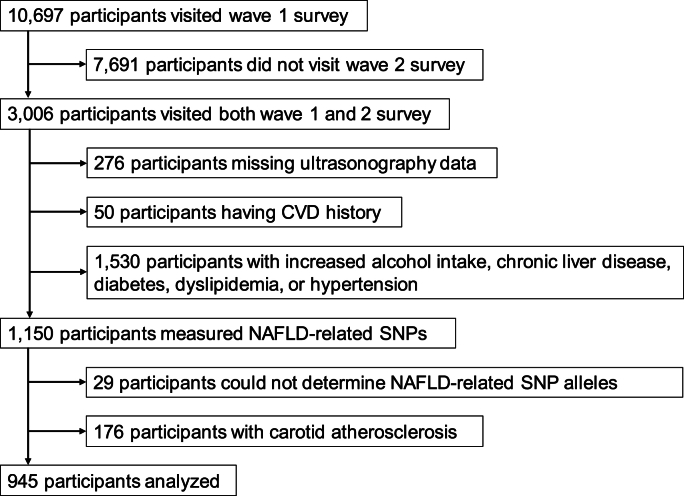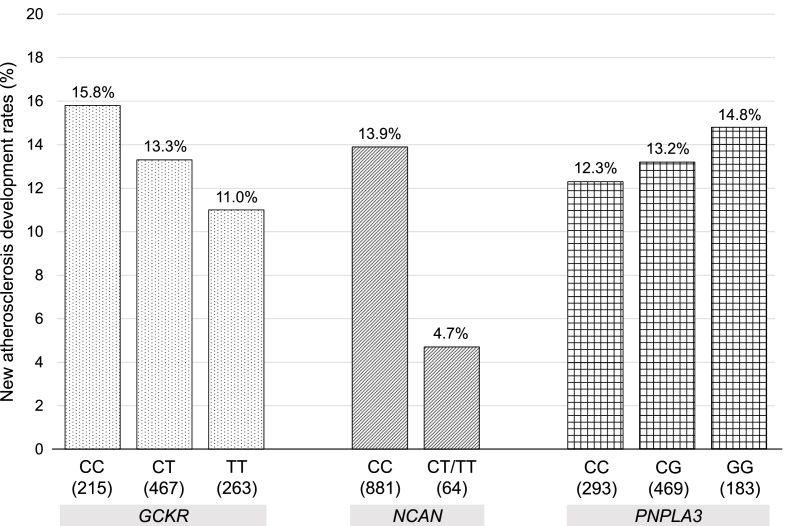nafld相关snp对颈动脉粥样硬化发展的影响一项为期五年的前瞻性观察研究。
IF 2.1
Q3 PERIPHERAL VASCULAR DISEASE
引用次数: 0
摘要
背景和目的:代谢功能障碍相关性脂肪性肝病(MASLD),以前称为非酒精性脂肪肝(NAFLD),其发病率已成为一个重要的公共卫生问题,并增加了动脉粥样硬化性心血管疾病的风险。本研究调查了在没有糖尿病、血脂异常和高血压的日本人群中,非酒精性脂肪肝相关单核苷酸多态性(SNPs)对颈动脉粥样硬化发展的影响:这项前瞻性观察研究是九州和冲绳人口研究(KOPS)的一部分,共纳入了 945 名参与者(中位年龄 55 [47, 63]),他们基线时没有颈动脉粥样硬化、酒精摄入增加、糖尿病、血脂异常、高血压或慢性肝炎。对非酒精性脂肪肝相关的 SNPs(GCKR、NCAN 和 PNPLA3)进行了基因分型,并使用超声波测量了颈动脉内膜中层厚度(cIMT)。通过单变量和多变量回归分析,评估非酒精性脂肪肝相关SNPs与五年内新发颈动脉粥样硬化的关系:结果:五年后,125名参与者(13.2%)出现了颈动脉粥样硬化。NCAN(rs2228603)T等位基因与较低的颈动脉粥样硬化发病率相关(NCAN CT/TT基因型为4.7%,CC基因型为13.9%;P = 0.04),NCAN T等位基因携带者的血脂状况良好。这些关联并不因招募地区或肥胖而改变。GCKR T等位基因和PNPLA3 C等位基因与低颈动脉粥样硬化发病率相关,但不显著:我们的研究结果表明,在没有代谢综合征的日本人中,一些与非酒精性脂肪肝相关的 SNPs 可能会通过脂质代谢影响动脉粥样硬化。本文章由计算机程序翻译,如有差异,请以英文原文为准。



Impact of NAFLD-related SNPs on the carotid atherosclerosis development; a five-year prospective observational study
Background and aims
The prevalence of metabolic dysfunction associated steatotic liver disease (MASLD), formerly known as nonalcoholic fatty liver disease (NAFLD), has become a significant public health concern with an increased atherosclerotic cardiovascular disease risk. This study investigates the impact of NAFLD-related single nucleotide polymorphisms (SNPs) on carotid atherosclerosis development in a Japanese population without diabetes, dyslipidemia, and hypertension.
Methods
The prospective observational study, part of the Kyushu and Okinawa Population Study (KOPS), included 945 participants (median age 55 [47, 63]) without carotid atherosclerosis, increased alcohol intake, diabetes, dyslipidemia, hypertension, or chronic hepatitis at baseline. NAFLD-related SNPs (GCKR, NCAN, and PNPLA3) were genotyped, and carotid intima-media thickness (cIMT) was measured using ultrasonography. Univariate and multivariate regression analyses were performed to assess the association of NAFLD-related SNPs on newly developed carotid atherosclerosis over five years.
Results
After five years, 125 (13.2 %) participants developed carotid atherosclerosis. The NCAN (rs2228603) T allele was associated with a lower incidence rate of carotid atherosclerosis (4.7 % in NCAN CT/TT genotype vs. 13.9 % in CC genotype; p = 0.04), and NCAN T allele carriers exhibited a favorable lipid profile. These associations were not altered by either recruiting area or obese. The GCKR T allele and PNPLA3 C allele were associated with low carotid atherosclerosis development rates but were not significant.
Conclusions
Our results suggested that some NAFLD-related SNPs may influence atherosclerosis through lipid metabolism among Japanese individuals without metabolic syndrome.
求助全文
通过发布文献求助,成功后即可免费获取论文全文。
去求助
来源期刊

Atherosclerosis plus
Cardiology and Cardiovascular Medicine
CiteScore
2.60
自引率
0.00%
发文量
0
审稿时长
66 days
 求助内容:
求助内容: 应助结果提醒方式:
应助结果提醒方式:


